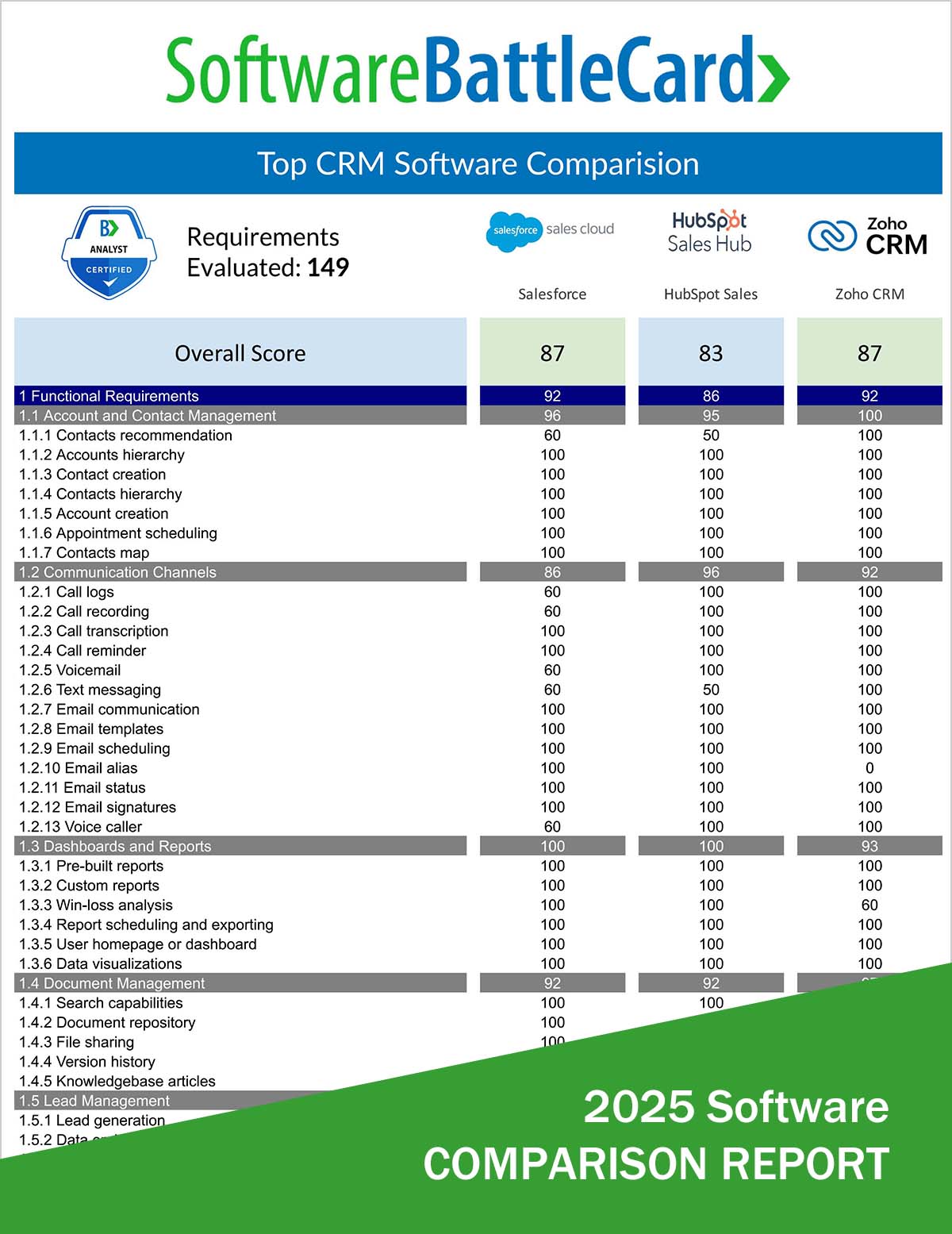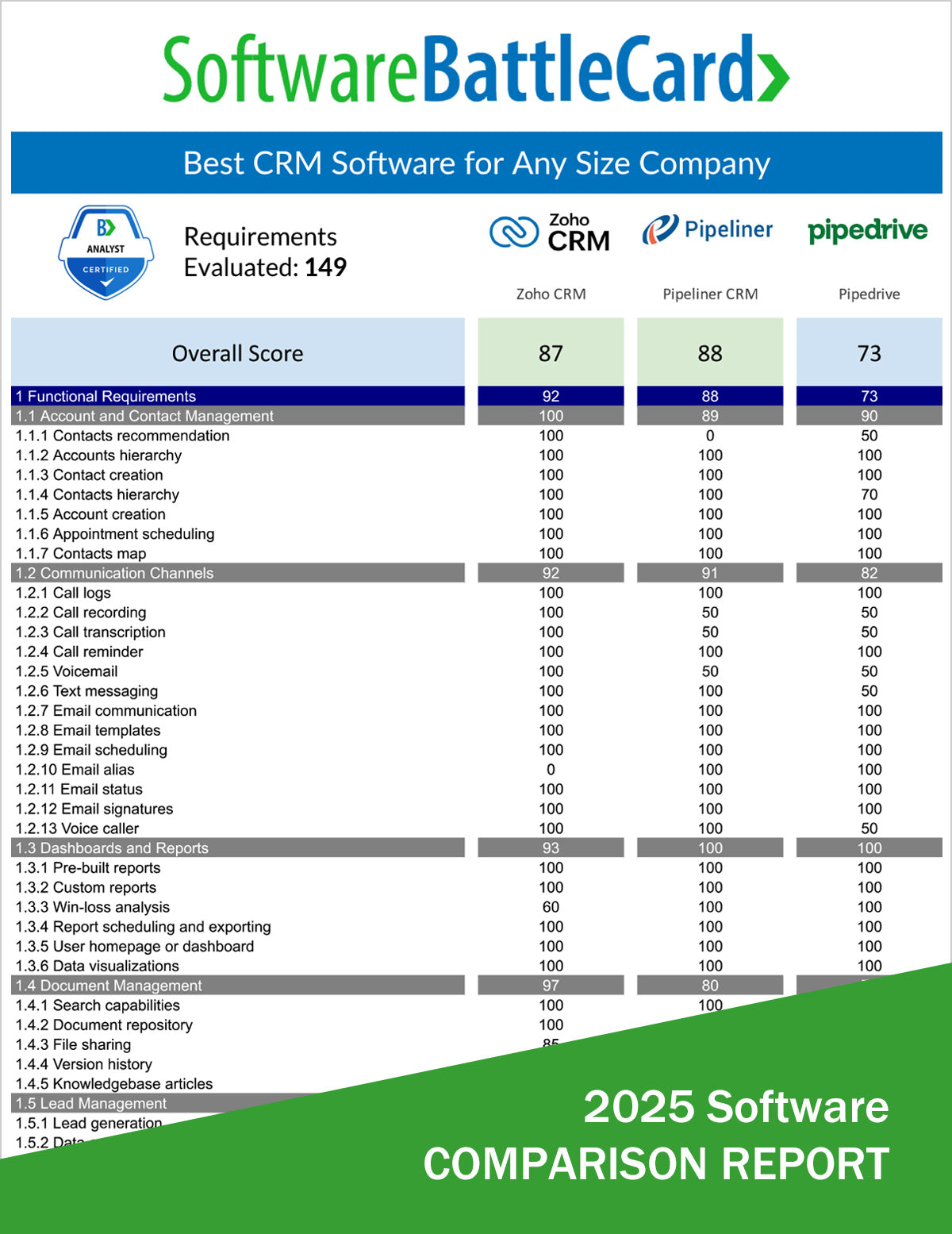7 Ways AI-enabled CRM Software Can Boost Sales Results
Sales teams today have more on their plates than ever. Finding the right leads, prioritizing opportunities, and managing customer relationships can feel overwhelming. What if the sales team could start their day not by sifting through the leads wondering where to begin, but by opening their CRM to find AI-powered insights already highlighting the most promising opportunities. That's exactly what’s happening across sales teams worldwide, thanks to AI-enabled CRM software.
Over the years, sales tools have come a long way. We've moved past rolodexes and spreadsheets, and even traditional CRM systems are no longer just about storing data and tracking interactions. AI-enabled CRMs are reshaping the way teams work, offering smarter, data-driven support that empowers better decisions.
And it’s not just a trend—it's a growing shift. According to Fortune Business Insights (2024), the global CRM market is expected to reach $262.74 billion by 2032, with AI features driving much of this growth.
Compare Top CRM Software Leaders

The impact is already clear: Salesforce's State of Sales Report 6th edition (2024) reveals that 81% of sales teams say they use AI today and consider artificial intelligence increasingly important to their sales strategy, while 83% of sales teams with AI saw revenue growth in the past year — versus 66% of teams without AI. Think about that for a moment – what could your team achieve with AI? Leading platforms like Salesforce, HubSpot CRM, ZOHO CRM and Microsoft CRM are already making this a reality.
Here’s what we’ll be looking at:
- Predictive Lead Scoring and Prioritization
- AI-Powered Sales Forecasting
- Personalized Customer Interactions
- AI-Driven Chatbots for 24/7 Customer Support
- Automation of Repetitive Tasks
- Enhanced Customer Segmentation
- Real-Time Sales Insights
- Next Steps
Predictive Lead Scoring and Prioritization
Deciding which leads to focus on has always been a challenge for sales teams. AI-driven predictive lead scoring simplifies this process by analyzing historical data, customer behavior, and interactions to provide a clearer picture of which leads are most likely to convert.
This means sales teams can spend less time debating priorities and more time engaging with the right prospects. It’s not about replacing intuition but complementing it with insights that help teams work more effectively and focus on opportunities that truly matter.
HubSpot CRM
HubSpot’s predictive lead scoring uses machine learning to calculate a "Likelihood to Close" score for each lead, based on historical sales data and customer behavior. This approach ensures that sales teams focus on leads that are statistically more likely to convert.
As Brian Halligan, CEO and co-founder of HubSpot, puts it:
"Sales teams no longer have to guess which leads will close. With predictive lead scoring, the data speaks for itself."
-
Contact Priority Segments: Leads are segmented into Very High, High, Medium, or Low priority tiers.
-
Actionable Insights: Sales teams are instantly alerted to their most promising opportunities, enabling them to act quickly.
Companies using HubSpot report an 18% boost in sales productivity and faster deal closures, thanks to smarter prioritization.
Zoho CRM
Zoho CRM takes lead scoring to the next level with Zia, its AI assistant. Zia continuously analyzes historical data and real-time interactions to dynamically adjust lead scores, ensuring that the sales team is always working with the most current information.
According to Sridhar Vembu, CEO of Zoho: "AI like Zia doesn't just automate tasks—it empowers sales teams to be more focused, productive, and informed."
-
Dynamic Scoring: Zia assigns a probability score that evolves with every new interaction, ensuring your team always works with up-to-date information.
-
Customized Lead Assignments: Leads can be routed to salespeople based on their skills or even shared interests, making personalized outreach easier.
-
Cold Lead Detection: Zia filters out leads with consistently low scores, allowing teams to focus their efforts on higher-value opportunities.
By prioritizing high-potential deals, Zoho CRM helps teams improve conversion rates and avoid wasting time on low-value leads.
Microsoft Dynamics 365
Microsoft Dynamics 365 takes lead scoring to the next level by integrating AI with data from Office 365 and LinkedIn, providing a holistic view of each lead.
Satya Nadella, CEO of Microsoft, states: “AI will play a central role in reshaping the future of sales, driving smarter decisions and enabling more personalized customer experiences.”
-
Integrated Data Insights: By combining historical data with real-time behavior, Dynamics 365 provides more accurate predictive lead scoring.
-
Lead Grades and Scores: Leads are scored and categorized into grades (A, B, C, D) to reflect their likelihood of conversion.
-
Sales Action Recommendations: The AI suggests specific actions, such as when to follow up or what resources to use, based on each lead’s behavior.
Sales teams using Dynamics 365 report faster deal cycles and improved lead nurturing, boosting win rates significantly.
Salesforce
Salesforce's Einstein AI is at the forefront of lead scoring, offering intelligent insights into every lead’s likelihood to convert.
Marc Benioff, CEO of Salesforce, notes: “Einstein is transforming sales by not just predicting outcomes but suggesting actions that drive better results."
-
Einstein Lead Scoring: Einstein predicts the likelihood of lead conversion and displays it as a clear score for every deal in your pipeline.
-
Customizable Criteria: Einstein learns from your specific business data, ensuring lead scores are highly relevant to your sales processes.
-
Proactive Alerts: AI alerts sales reps to leads requiring immediate attention, helping them close deals faster.
According to Salesforce, companies using Einstein AI experience up to 43% higher sales productivity and a 300% increase in lead conversion rates.
Compare Top CRM Software Leaders
AI-Powered Sales Forecasting
According to Gartner, only 45% of sales leaders trust their organization’s sales forecasts. While sales reps often rely on intuition, this can lead to inaccuracies.

Traditional sales forecasting was based on a mix of guesswork and intuition, but AI-driven CRM platforms have revolutionized the process. These tools analyse historical data, customer trends, and market patterns to provide reliable forecasts, offering actionable insights for confident decision-making.
Salesforce
With Einstein Forecasting, Salesforce analyses past sales data and market trends to predict future sales with high accuracy.
As Laura, a Salesforce customer, explains,
“Einstein Forecasting helps me see AI-driven predictions and focus on areas that need attention to ensure my team makes their quota.”
Predictions are based on opportunity segments, client groups, or custom fields, and come with confidence ranges for sales outcomes.
Zoho CRM
Zoho Analytics leverages AI to automate sales forecasting, selecting the best predictive model based on your data. It enables what-if analysis, allowing you to simulate different scenarios like varying budgets for more accurate sales predictions.
Zoho's AI assistant, Zia, analyses historical data to predict deal outcomes, assigning scores to leads and deals for better prioritization.
As Divya Sundaraju, Assistant Manager at FundsIndia, says, "Zoho CRM's artificial intelligence, Zia, is extremely impressive. As a CRM manager, I can plug myself in directly to the sales team and make sure they never slip out of deals, with the help of working tips provided by Zia."
HubSpot CRM
HubSpot's predictive lead scoring is a prime example. By analysing vast amounts of data, it helps sales teams identify top leads and predict customer behaviour.
As Nathalie Castro, Growth Specialist at HubSpot, states, "AI makes our jobs easier and more effective, automating tasks and improving productivity."
AI is enhancing CRM tools, allowing for faster sales cycles and better decision-making.
According to Leticia Henry, Sales Manager at HubSpot, "AI speeds up tasks like follow-up emails and provides managers with deeper insights into deals, helping to fine-tune coaching."
Microsoft Dynamics 365
Microsoft Dynamics 365 uses AI to provide accurate sales forecasts by analyzing historical data and the current pipeline. It helps sales teams predict revenue, track performance, and identify risks to meet targets. With detailed, AI-powered insights, Dynamics 365 enables better decision-making and enhances sales strategy with a comprehensive view of the pipeline.
Personalized Customer Interactions
In today’s competitive landscape, personalized customer interaction is essential for driving engagement and loyalty. Research shows that 71% of consumers expect personalized experiences, and businesses that deliver can see significant increases in customer satisfaction and sales . AI-driven CRM platforms are driving change in how companies engage with their customers, making interactions more relevant and timely.

Salesforce
Salesforce’s Einstein AI plays a pivotal role in personalizing customer interactions. By analysing customer data across various touchpoints, Einstein provides insights that help sales representatives understand customer preferences and behaviours.
As Mark, a Salesforce user, notes, “Einstein helps us anticipate our customers' needs before they even express them, allowing us to engage in meaningful conversations.”
The AI-driven recommendations empower sales teams to deliver tailored content and offers, significantly improving engagement rates.
HubSpot CRM
HubSpot leverages AI to enhance its marketing automation tools, allowing for hyper-personalized email campaigns and content delivery. The platform analyses user behaviour and engagement metrics to segment audiences effectively.
Nathalie Castro, a Growth Specialist at HubSpot, explains, “With HubSpot's AI capabilities, we can create dynamic content that resonates with individual users based on their past interactions.”
This level of personalization not only increases open rates but also drives conversions by delivering the right message at the right time.
Zoho CRM
Zoho’s AI assistant, Zia, is instrumental in personalizing customer interactions by providing insights based on historical data. Zia analyses customer interactions and suggests the best times to reach out or follow up with leads.
Divya Sundaraju, Assistant Manager at FundsIndia, states, “Zia’s insights help us tailor our approach to each client, ensuring we communicate in a way that aligns with their preferences.”
This personalization fosters stronger relationships and enhances overall customer satisfaction.
Microsoft Dynamics 365
Microsoft Dynamics 365 utilizes AI to create a comprehensive view of customer interactions across all channels. By analysing data from various sources, it helps sales teams understand customer needs and preferences more deeply.
As Leticia Henry, Sales Manager at Microsoft Dynamics 365, mentions, “The ability to see all customer touchpoints in one place allows us to personalize our outreach effectively.”
This holistic approach enables sales teams to craft messages that resonate with customers on a personal level.
AI-Driven Chatbots for 24/7 Customer Support
In the era where customer expectations are higher than ever, providing reliable support around the clock has become essential. According to a survey by HubSpot, 90% of customers expect an immediate response when they have a customer service question. Traditional support models often struggle to meet these demands, leading to longer wait times and decreased customer satisfaction. However, AI-driven chatbots are redefining customer support by offering 24/7 assistance, ensuring that customers receive timely responses regardless of the hour.

Salesforce
Salesforce offers advanced AI chatbot capabilities through its Agentforce platform. These chatbots can handle a variety of customer inquiries, from answering FAQs to resolving issues without human intervention. As noted in a Salesforce case study, businesses that implemented their AI chatbots reported a 40% reduction in response times and a 30% increase in customer satisfaction.
A user from a retail company shared, “The Agentforce chatbot allows us to provide instant support, freeing up our human agents to focus on more complex queries.”
This capability not only improves efficiency but also enhances the overall customer experience.
HubSpot CRM
HubSpot’s Service Hub features an AI-powered chatbot that can engage with customers at any time. The chatbot can answer common questions, create tickets, and even look up articles from the knowledge base. According to HubSpot’s findings, companies using their chatbot solutions have seen a 25% increase in ticket resolution rates due to the automation of routine inquiries.
Nathalie Castro, a Growth Specialist at HubSpot, explains, “Our AI chatbot allows us to provide delightful support at scale, ensuring that customers get answers quickly.”
The integration of AI chatbots enables businesses to handle high volumes of inquiries efficiently while improving customer satisfaction.
Zoho CRM
Zoho’s AI assistant, Zia, is designed to enhance customer interactions through intelligent automation. Zia can engage customers via chat and provide instant responses based on historical data and common queries.
Divya Sundaraju from FundsIndia states, “Zia’s ability to handle basic inquiries means our team can focus on solving more complex problems.”
This not only streamlines operations but also ensures that customers receive timely support.
Microsoft Dynamics 365
Microsoft Dynamics 365 incorporates AI-driven chatbots that provide 24/7 support across various channels. These chatbots analyse customer interactions and learn from them, improving their responses over time.
Leticia Henry from Microsoft Dynamics 365 emphasizes the importance of this technology: “Our chatbots help us maintain high service levels by being available around the clock. They handle routine questions efficiently, allowing our agents to concentrate on high-value tasks.”
This approach leads to improved operational efficiency and enhanced customer experiences.
Compare Top CRM Software Leaders
Automation of Repetitive Tasks
According to a study by Salesforce, sales professionals spend nearly 66% of their time on non-selling activities, such as data entry and administrative tasks. This not only hinders productivity but also distracts teams from focusing on what really matters: building relationships and closing deals. Fortunately, AI-driven automation is transforming how sales teams operate by streamlining repetitive tasks, allowing them to concentrate on high-impact activities.

Salesforce
Salesforce’s Agentforce platform incorporates AI to automate various repetitive tasks, such as updating records and sending follow-up emails. This automation allows sales representatives to spend more time engaging with customers rather than getting bogged down in administrative work. As noted in a Salesforce report, companies that implemented these automation features saw a 30% increase in productivity.
A Salesforce user shared, “With Agentforce automating routine tasks, my team can focus on nurturing leads and closing deals.” This shift not only enhances efficiency but also improves overall sales performance.
HubSpot CRM
HubSpot’s CRM offers powerful automation tools that help streamline repetitive tasks like lead nurturing and email marketing. By setting up automated workflows, sales teams can ensure timely follow-ups without manual intervention. According to HubSpot’s research, businesses that utilize their automation features report a 25% increase in conversion rates.
Nathalie Castro, a Growth Specialist at HubSpot, states, “Automation allows us to maintain consistent communication with our leads while freeing up time for strategic initiatives.”
This capability enables teams to engage customers effectively while minimizing manual workload.
Zoho CRM
Zoho CRM leverages AI through its assistant, Zia, to automate routine tasks such as lead scoring and follow-up reminders. Zia analyses customer interactions and automatically updates the CRM with relevant information. A report from Zoho indicates that organizations using Zia experienced a 50% reduction in time spent on administrative tasks.
Divya Sundaraju from FundsIndia explains, “Zia’s automation capabilities allow our team to focus on high-value interactions rather than getting lost in data entry.”
This not only improves productivity but also enhances the quality of customer interactions.
Microsoft Dynamics 365
Microsoft Dynamics 365 integrates AI-driven automation to streamline various sales processes. The platform automates tasks such as scheduling meetings and sending reminders, which helps sales teams stay organized and efficient.
Leticia Henry from Microsoft Dynamics 365 emphasizes the importance of this technology: “By automating repetitive tasks, our team can prioritize meaningful customer engagements.”
This approach leads to improved operational efficiency and allows sales representatives to dedicate more time to building relationships.
The benefits of automating repetitive tasks in sales are substantial. Research shows that companies leveraging AI-driven automation can achieve up to a 40% increase in overall productivity .
Enhanced Customer Segmentation
Understanding customer needs and preferences is paramount. Traditional segmentation methods often rely on broad demographics, which can lead to missed opportunities for personalization. AI-driven customer segmentation is reimagining this process by enabling businesses to create highly targeted marketing strategies based on detailed customer insights.
Salesforce
Salesforce uses advanced AI algorithms within its platform to analyse customer data and segment audiences effectively. By leveraging machine learning, Salesforce can identify patterns and behaviours that traditional methods might overlook.
As Ketan Karkhanis, EVP & General Manager of Sales Cloud at Salesforce, states, “The ability to leverage data and AI allows us to create nuanced customer profiles that enable precise targeting.”
This level of precision in targeting leads to improved engagement and higher conversion rates.
HubSpot CRM
HubSpot’s CRM employs AI to enhance its segmentation capabilities, allowing businesses to categorize customers based on their behaviours, preferences, and interactions with the brand. This approach goes beyond basic demographic data to create dynamic segments that evolve with customer behaviour.
Nathalie Nahai, a digital psychologist and author, emphasizes the importance of understanding customers: “AI helps us understand our customers better, enabling us to deliver personalized experiences that resonate with them.”
This enhanced understanding fosters stronger relationships and drives loyalty.
Zoho CRM
Zoho CRM utilizes its AI assistant, Zia, to automate the segmentation process. Zia analyses historical data and real-time interactions to create detailed customer profiles that inform marketing strategies.
Raju Vegesna, Chief Evangelist at Zoho, notes, “Zia’s ability to segment our customers based on their behaviour allows us to craft messages that truly speak to their needs.”
This targeted approach not only enhances engagement but also boosts overall sales performance.
Microsoft Dynamics 365
Microsoft Dynamics 365 employs AI-driven analytics to refine customer segmentation continuously. By analysing data from various sources, the platform helps businesses identify emerging trends and adjust their marketing strategies accordingly.
Leticia Henry, Principal Program Manager at Microsoft Dynamics 365, emphasizes the importance of this technology: “With AI-powered insights, we can anticipate customer needs and tailor our outreach effectively.”
This proactive approach leads to improved customer satisfaction and increased sales opportunities.
Real-Time Sales Insights
In the dynamic world of sales, having access to real-time insights is crucial for effective decision-making and customer engagement. According to Salesforce, companies that utilize real-time data can see a significant increase in sales productivity. Traditional methods of gathering insights often rely on historical data, which can lead to delays in response and missed opportunities. However, AI-driven CRM platforms are changing the game by providing immediate access to actionable insights that empower sales teams to respond swiftly to customer needs.

Salesforce
Salesforce's Agentforce platform integrates AI capabilities that provide real-time insights into customer interactions and sales performance. With tools like Einstein Analytics, sales teams can monitor key metrics and receive alerts about significant changes in customer behaviour or engagement
.As Ketan Karkhanis, EVP & General Manager of Sales Cloud at Salesforce, states, “This means that sales teams can shift their attention from processes to connecting with people, giving them more time to focus on what they do best – selling.”
These insights enable sales representatives to make informed decisions on the fly, ensuring they meet customer expectations promptly
HubSpot CRM
HubSpot’s CRM harnesses the power of AI to deliver real-time insights that enhance customer interactions. The platform analyses customer data continuously, providing sales teams with up-to-date information about leads and their behaviours.
Dan Tyre, a Sales Director at HubSpot, emphasizes, “AI-driven insights allow us to understand our customers better and respond to their needs instantly.”
This capability not only improves engagement but also helps in identifying upsell opportunities as they arise, leading to increased sales conversions.
Zoho CRM
Zoho CRMs AI assistant feature, Zia, provides real-time analytics and insights into sales activities. Zia monitors customer interactions and generates alerts for any significant changes in engagement levels or deal progress.
Raju Vegesna, Chief Evangelist at Zoho, notes, “Zia helps us stay on top of our deals by providing timely updates and insights. This means we can act quickly when a lead shows interest or when we need to follow up.”
The ability to respond in real-time enhances the overall customer experience and increases the likelihood of closing deals.
Microsoft Dynamics 365
Microsoft Dynamics 365 employs AI-driven analytics to deliver real-time sales insights across various channels. The platform aggregates data from multiple sources, allowing sales teams to access comprehensive information about customer interactions instantly.
Marcus Schmidt, Principal Program Manager at Microsoft, explains, “Real-time insights enable our team to adapt quickly to changing customer needs and preferences.”
This agility not only improves customer satisfaction but also helps in optimizing sales strategies based on current market conditions.
Next Steps
AI-enabled CRM software is shaping the future of sales strategies, helping teams work smarter, not harder. The key is to adopt AI thoughtfully, ensuring it aligns with your business goals and complements your team's strengths.
If the insights from these 7 ways AI can boost sales results have highlighted gaps in your current CRM features or inspired you to explore new possibilities, now is the perfect time to evaluate your options. Consider testing AI-powered features like predictive analytics, personalized engagement tools, and behaviour analysis to see how they can redefine your sales pipeline.
Not sure where to start? This comprehensive CRM features comparison guide can help you navigate the leading platforms and find the right fit for your business needs.!
Compare Top CRM Software Leaders
Helpful Resources for Choosing the Right CRM System
Looking for more insights on CRM systems? Here are some great resources to check out:
- Top 15 CRM Software Pricing BattleCard - See the comparison
- Best CRM Software for Any Size Company: Zoho CRM vs. Pipeliner CRM vs. Pipedrive - See the comparison
- Best CRM Software BattleCard: Salesforce vs. HubSpot Sales vs. Zoho CRM - See how they stack up
- Best CRM Software for Lead Management 2025―Pipedrive vs HubSpot Sales vs Zoho CRM - See the BattleCard
- Marketing Automation Software BattleCard: HubSpot vs. Mailchimp vs. Zoho Marketing Automation - See the BattleCard
- Best CRM Software for Small Businesses―HubSpot CRM vs. Zoho CRM vs. Freshworks - See the BattleCard






